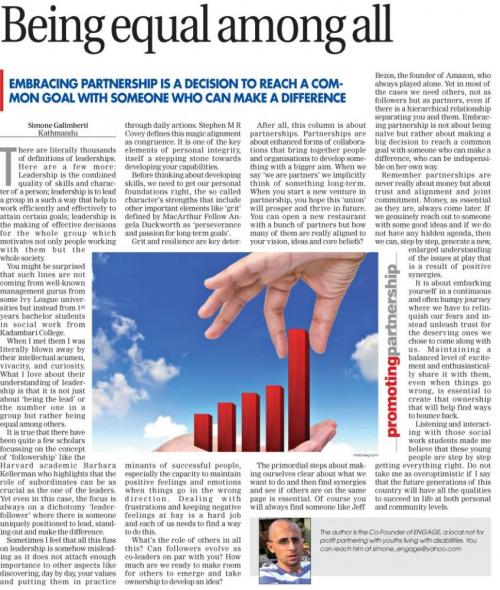
There are literally thousands definitions of leaderships. Here few more: Leadership is the combined quality of skills and character of a person; Leadership is to lead a group in a such a way that help to work efficiently and effectively to attain certain goals; Leadership is the making of effective decisions for the whole group which motivates not only people working with them but the whole society.
You might be surprised that such lines are not coming from very well renown (at least not yet) management guru from some Ivy League universities but instead from 1st years bachelor students in social work from Kadambari College.
When I met them I was literally blown away by their intellectual acumen, vivacity, curiosity.
What I love about their understanding of leadership is that it is not just about “being the lead”, the number one in a group but rather being an equal among others.
Too often and possibly for commercial reasons, the focus is really about elevating someone above those who are “just” considered as followers.
It is true that there have been quite a few scholars focusing on the concept of “followership” like the Harvard academic Barbara Kellerman that highlights that the role of subordinates can be as crucial as the one of the leaders.
Yet even in this case, the focus is always on a dichotomy “leader-follower” where there is someone uniquely positioned to lead, standing out and make the difference and the rest of the groups doing their role a bit like in a sailing boat where you find the skipper and the rest of the crew.
Sometimes I feel that all this fuss on leadership is somehow misleading as it does not attach enough importance to other aspects like discovering, day by day, your values and putting them in practice through daily actions.
Stephen M. R. Covey defines this “magic” alignment as congruence. It is one of the key elements of personal integrity, itself a step-stone towards developing your capabilities.
Before thinking about developing skills, we need to get our personal foundations right, the so called character’s strengths that include other important elements like “grit” defined by MacArthur Fellow Angela Duckworth as “perseverance and passion for long-term goals”.
Grit and resilience are key determinants of successful people, especially the capacity to maintain positive feelings and emotions when things go in the wrong.
Dealing with frustrations and keeping at bay negative feelings is a hard job and each of us needs to find a way to do this.
What’s the role of others in all this? Can be followers evolve as co-leaders on par with you?
How much are we ready to make room for others to emerge and take ownership to develop an idea?
After all, this column is about partnerships. Partnerships are about enhanced forms of collaborations that bring together people and organizations to develop something with a bigger aim.
When we say “we are partners” you implicitly think of something long term. You and your loved one can be a life partner. When you start a new venture in partnership, you hope this will “union” will prosper and thrive in future.
You can open a new restaurant with a bunch of partners but how many of them are really aligned to your vision, ideas and core believes?
The primordial steps about being ourselves clear about what we want to do and then find synergies and see if others are on the same page is essential.
Of course you will always find someone like Jeff Bezos, the founder of Amazon, who always played alone.
Yet in most of the cases we need others not as followers but as partners even if there is a hierarchical relationship separating you and them.
Your subordinate, theoretically a follower, can be your partner and showcase full mastery in her particular area.
Embracing partnership is not about being naïve but rather about making a big decision to reach a common goal with someone who can make a difference, who can be indispensible on her own way.
We are always afraid that someone will pull your leg. There are plenty of people who love taking short cuts instead of going for the long haul.
Remember partnerships are never really about money but about trust and alignment and joint commitment. Money, as essential as they are, always come later.
If we genuinely reach out someone with some good ideas and if we do not have any hidden agenda, then we can, step by step, generate a new, enlarged understanding of the issues at play that is a result of positive synergies.
It is about embarking yourself in a continuous and often bumpy journey where we have to relinquish our fears and instead unleash trust for the deserving ones we chose to come along with us.
Maintaining a balanced level of excitement and enthusiastically share it with them, even when things go wrong, is essential to create that ownership that will help find ways to bounce back.
Listening and interacting with those social work students makes me believe that these young folks are step by step getting everything right.
Do not take me as overoptimistic if I say that future generations of this country will have all the qualities to succeed at life at personal and community levels.










Add new comment